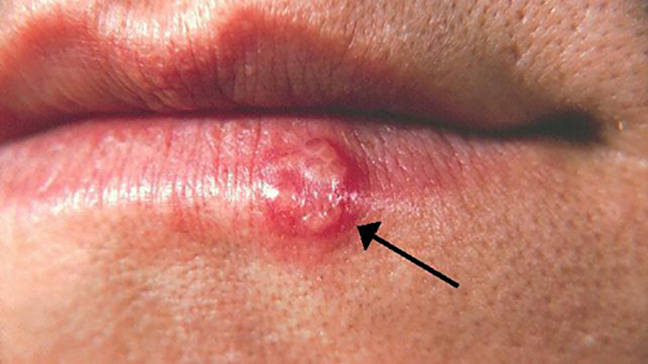spot in lip Red spots on the lips can be an alarming sight, especially if you’re not sure what they are or where they came from. Many people worry that these spots are something serious and go to their doctor for treatment. While it is always a good idea to consult with your physician for any medical concerns, it may also be helpful to understand what kinds of conditions may cause red spots on the lips and what treatment options exist. In this article, we will discuss the different causes of red spots on the lips, treatment options available, and prevention tips so you can keep your lips looking healthy and beautiful.
What is a cold sore?

Cold sores (also called fever blisters) are small, fluid-filled blisters that develop on the lips, mouth, throat, chin, or cheeks. They are caused by the herpes simplex virus (HSV). Cold sores usually heal in 7-10 days without treatment.
There are two types of HSV: type 1 and type 2. Type 1 is the most common and is usually responsible for cold sores. Type 2 is less common and is typically responsible for genital herpes.
Most people with HSV-1 acquire it during childhood from close contact with someone who has the virus. The virus is spread through saliva (such as when sharing a drink or kiss) or contact with infected skin (such as through close contact with someone who has a cold sore).
Once you have HSV-1, it remains in your body for life. The virus may become active from time to time, causing cold sores. triggers can include stress, sun exposure, fever, or hormonal changes. When the virus is active, it travels to the surface of the skin where it begins replicating again. This process causes the characteristic symptoms of a cold sore: redness, swelling, and blistering.
There is no cure for HSV-1 infection, but there are treatments that can help manage symptoms and shorten the duration of outbreaks. Treatment options include oral antiviral medications and topical creams or ointments. There are also home remedies
What causes cold sores?
There are a few different viruses that can cause cold sores, most commonly the herpes simplex virus type 1 (HSV-1). This virus is usually passed on through contact with saliva, such as sharing utensils or kissing, and can lie dormant in your body for years before causing an outbreak. Other triggers for cold sore outbreaks can include stress, exhaustion, hormonal changes, or sunlight exposure.
Once the HSV-1 virus has entered your body, it will live there forever. Cold sores are caused by reactivation of the virus, which usually happens when you’re run down or under stress. The sores usually appear as a cluster of small blisters on the lip or around the mouth. They can be painful and sometimes last for several weeks.
There is no cure for HSV-1, but there are treatments that can help to manage the symptoms and shorten the duration of cold sore outbreaks. These include antiviral medications that are available as creams, ointments, or pills. There are also home remedies that some people find helpful in relieving the pain and itchiness associated with cold sores. These include applying a lip balm or cream, placing a cool damp cloth on the sore, and avoiding spicy or acidic foods that could irritate the area further.
What are the spot in lip symptoms of a cold sore?

A cold sore is a small, painful blister that typically appears on the lips, mouth, or nose. Cold sores are caused by the herpes simplex virus (HSV). There are two types of HSV: HSV-1 and HSV-2. HSV-1 is the most common type of HSV and is usually responsible for cold sores. Cold sores generally last for 7-10 days and will eventually crust over and heal without scarring.
The most common symptom of a cold sore is a small, painful blister on the lip, mouth, or nose. Other symptoms may include:
-Fever
-Sore throat
-Swollen lymph nodes
-Muscle aches
-Fatigue
spot in lip How can you treat a cold sore?
There are a number of ways that you can treat a cold sore. The most important thing is to start treatment as soon as possible. This will help to prevent the sore from getting worse and will also help to shorten the healing time.
There are a number of over-the-counter treatments that you can use. These include creams, gels, and ointments. You can also find products that contain docosanol, which is an antiviral agent. There are also prescription medications that your doctor can prescribe if your cold sore is severe.
If you have a cold sore, it is important to keep it clean and dry. This will help to prevent it from spreading. You should also avoid picking at or touching the sore. If you do touch it, be sure to wash your hands afterwards.
It is also important to avoid sharing items with someone who has a cold sore. This includes lip balm, lipstick, straws, toothbrushes, and cups. If you must share something, be sure to disinfect it beforehand.
spot in lip How can you prevent cold sores?
There are a few things you can do to prevent cold sores. First, avoid sharing utensils or cups with someone who has a cold sore. Second, don’t touch your eyes after touching a cold sore. Third, use lip balm or cream to keep your lips moisturized and avoid cracking. Finally, if you feel a tingling sensation on your lip, apply a topical cream or ointment right away.

1 Comment
can flonase make you sleepy what is allergy medicine called best allergy pill for itching